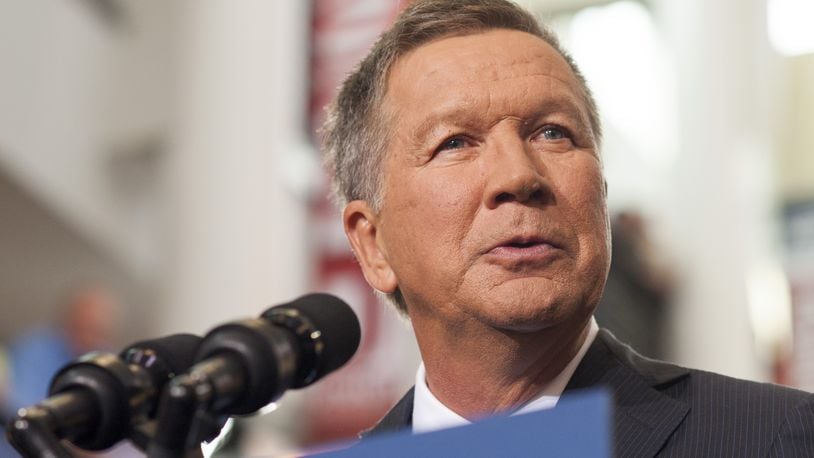Producer: Rise to Rise, a Super Pac supporting former Florida Gov. Jeb Bush
Where to see it: On statewide television in New Hampshire.
Script: Male announcer: "Where do you line up with John Kasich on the issues? Take The Kasich Quiz. Forced ObamaCare expansion in Ohio. Voted for massive defense cuts and defended the process that closed Pease Air Force Base, which cost thousands of local jobs. Even had the worst rating on spending of any governor in the country -- Republican or Democrat. John Kasich: Wrong on New Hampshire issues. Right to Rise USA is responsible for the content of this message."
Analysis: The commercial attempts to poke holes in Kasich’s claim he supports a strong national defense and will restrain federal spending. Although the facts used in the commercial are accurate, producers cherry pick some facts to slightly distort Kasich’s overall record as governor and the U.S. House.
The first claim is true. As governor in 2013, Kasich bypassed objections from conservatives in the Ohio legislature and used the state controlling board – a seven-member spending oversight panel consisting of six lawmakers and one gubernatorial appointee – to accept hundreds of millions of federal Medicaid dollars under President Obama’s 2010 health law to provide health coverage to nearly 700,000 low-income people in Ohio.
Although many Republican governors refused to accept the money, Kasich argued the dollars provided health coverage to low-income people and saved money in the long run by funneling people away from expensive emergency rooms into more efficient health delivery. Kasich remains opposed to the rest of the 2010 law – known as Obamacare -- and did not establish a state-based marketplace for people to buy insurance under the law.
On the second claim, Kasich -- as a member of the U.S. House in 1988 -- backed a bill creating an independent commission to decide to close obsolete military bases, a move designed to save billions of taxpayers’ dollars. Congress would only have the authority to reject the commission’s entire recommendations.
Chaired by former Defense Secretary Frank Carlucci, the commission called for closing 86 bases, including Pease Air Force Base in New Hampshire. At the time, Kasich said the panel “missed a golden opportunity to do more, and we have to do more” in closing bases no longer needed.
Pease Air Force base closed in 1991 with the loss of jobs. But the commercial leaves out the fact that since then, the area has boomed with private development with nearly 10,000 jobs.
In addition, five separate commissions from 1988 through 2005 recommended closing 350 different bases across the country -- no longer needed by the Pentagon because of the end of the Cold War.
The final claim is based on an annual report by the Cato Institute, a libertarian-leaning organization in Washington, which grades the nation’s governors on taxes and spending. It is true, on spending alone Cato gave Kasich the lowest grade of any governor. But the claim is little misleading because on taxes and spending combined, Kasich earned a D along with four other Republican governors. The reason is Cato gave Kasich a better overall grade on both taxes and spending is because he championed personal income tax reductions during the past three years.
The dispute between Cato and Kasich revolves around two different ways to calculate how much the state spends in its two-year budget cycles.
Cato cites what is known as the general-revenue fund, which includes money Ohio collects in state taxes as well as federal dollars for programs such as Medicaid, which provides health coverage for low-income people.
The state plans to spend $71.2 billion in general-revenue fund money during the 2016-17 budget cycle. That is substantially higher than the $52.5 billion in general-revenue spending for the 2011-12 spending years, which was Kasich's first two-year budget.
But Kasich and his aides prefer to cite what is known as the all-funds budget, a much larger pool of money that includes cash the state collects through licenses and fees, and hundreds of millions of dollars in federal grants for education and the environment.
By pointing to the all-funds budget, Kasich can accurately claim that overall state spending will increase by 2.1 percent between the 2016 and 2017 spending years. But even under the all-funds budget, state spending increased by 7.61 percent between 2015 and 2016.
There is no question Kasich entered office with the state facing an $8 billion budget shortfall, which now has been transformed into a $2 billion surplus.
About the Author
